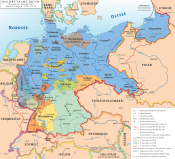
The Frontier March of Posen–West Prussia was a province of Prussia from 1922 to 1938, covering most of lands of historical Greater Poland that were not included in Second Polish Republic. Posen–West Prussia was established in 1922 as a province of the Free State of Prussia within Weimar Germany, formed from merging three remaining non-contiguous territories of Posen and West Prussia, which had lost the majority of their territory to the Second Polish Republic following the Greater Poland Uprising. From 1934, Posen–West Prussia was de facto ruled by Brandenburg until it was dissolved by Nazi Germany, effective 1 October 1938 and its territory divided between the provinces of Pomerania, Brandenburg and Silesia. Schneidemühl was the provincial capital. Today, lands of the province are entirely contained within Poland.
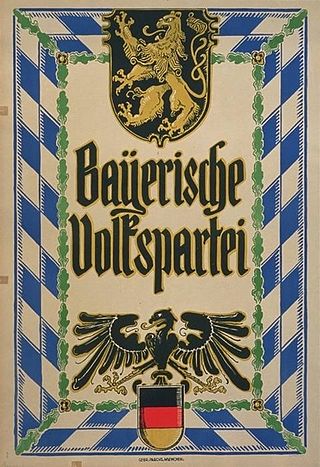
The Bavarian People's Party was a Catholic political party in Bavaria during the Weimar Republic. After the collapse of the German Empire in 1918, it split away from the national-level Catholic Centre Party and formed the BVP in order to pursue a more conservative and particularist Bavarian course. It consistently had more seats in the Bavarian state parliament than any other party and provided all Bavarian minister presidents from 1920 on. In the national Reichstag it remained a minor player with only about three percent of total votes in all elections. The BVP disbanded shortly after the Nazi seizure of power in early 1933.

Dietrich Klagges was a Nazi Party politician and from 1933 to 1945 the appointed premier (Ministerpräsident) of the now abolished Free State of Brunswick. He also went by the pseudonym Rudolf Berg.

Friedrich Hildebrandt was a Nazi Party politician, a Gauleiter and an SS-Obergruppenführer. He was found guilty and executed for war crimes committed during the Second World War.

The Free State of Prussia was one of the constituent states of Germany from 1918 to 1947. The successor to the Kingdom of Prussia after the defeat of the German Empire in World War I, it continued to be the dominant state in Germany during the Weimar Republic, as it had been during the empire, even though most of Germany's post-war territorial losses in Europe had come from its lands. It was home to the federal capital Berlin and had 62% of Germany's territory and 61% of its population. Prussia changed from the authoritarian state it had been in the past and became a parliamentary democracy under its 1920 constitution. During the Weimar period it was governed almost entirely by pro-democratic parties and proved more politically stable than the Republic itself. With only brief interruptions, the Social Democratic Party (SPD) provided the Minister President. Its Ministers of the Interior, also from the SPD, pushed republican reform of the administration and police, with the result that Prussia was considered a bulwark of democracy within the Weimar Republic.

The Republic of Baden was a German state that existed during the time of the Weimar Republic, formed after the abolition of the Grand Duchy of Baden in 1918. It is now part of the modern German state of Baden-Württemberg.
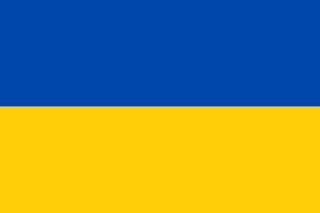
The Free State of Brunswick was a state of the German Reich in the time of the Weimar Republic. It was formed after the abolition of the Duchy of Brunswick in the course of the German Revolution of 1918–19. Its capital was Braunschweig (Brunswick). In 1933 it was de facto abolished by Nazi Germany. The free state was disestablished after the Second World War in 1946.
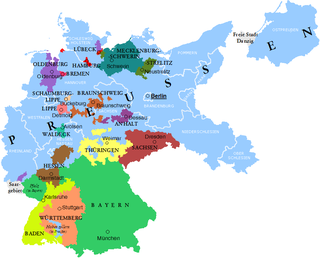
The Free State of Prussia held elections to its Landtag between 1919 and 1933. From 1919 through 1928, these elections gave a plurality to the SPD. In 1932 and 1933, the NSDAP won pluralities, generally in line with the rest of Germany. The Landtag subsequently was formally abolished as a result of the "Law on the Reconstruction of the Reich" of 30 January 1934 which replaced the German federal system with a unitary state.
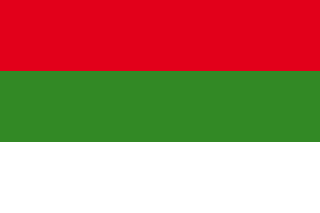
The Free State of Anhalt was formed after Joachim Ernst, Duke of Anhalt abdicated on 12 November 1918, ending the Duchy of Anhalt. It became a state of Germany under the Weimar Republic (1919–1933) and for most of that time it was led by politicians from the Social-Democratic Party of Germany (SPD).

The Free State of Schaumburg-Lippe was created following the abdication of Prince Adolf II of Schaumburg-Lippe on 15 November 1918, following the German Revolution. It was a state in Germany during the Weimar Republic and Nazi Germany. The democratic government was suppressed during Nazi rule. At the end of the Second World War, the British military occupation government decreed on 1 November 1946 the union of Schaumburg-Lippe, Hannover, Braunschweig and Oldenburg to form the new state of Lower Saxony.
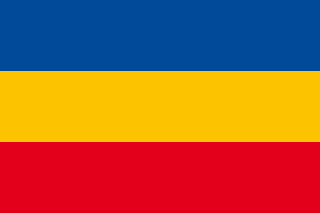
The Free State of Mecklenburg-Schwerin was a state in the Weimar Republic that was established on 14 November 1918 upon the abdication of the Grand Duke of Mecklenburg-Schwerin following the German Revolution. In 1933, after the onset of Nazi rule, it was united with the smaller neighbouring Free State of Mecklenburg-Strelitz to form the new united state of Mecklenburg on 1 January 1934.

The Free State of Lippe was created following the abdication of Prince Leopold IV of the Principality of Lippe on 15 November 1918, following the German Revolution. It was a state in Germany during the Weimar Republic and Nazi Germany. After the end of the Second World War, the Control Commission for Germany – British Element (CCG/BE) abolished the state of Lippe in January 1947 and incorporated it into the new German state of North Rhine-Westphalia that had been created three months earlier.
The Agricultural League or National Rural League was a German agrarian association during the Weimar Republic which was led by landowners with property east of the Elbe. It was allied with the German National People's Party and later the National Socialist German Workers' Party
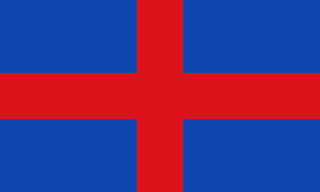
The Free State of Oldenburg was a federated state that existed during the Weimar Republic and Nazi Germany. It was established in 1918 following the abdication of the Grand Duke Frederick Augustus II after the German Revolution and was abolished by the Allies following the Second World War.

The 1931 Prussian Landtag referendum was an attempt to prematurely dissolve the sitting session of the Landtag (parliament) of the Weimar German state of Prussia. The referendum, which took place according to Article 6 of the 1920 Prussian Constitution, was triggered by a petition launched in the spring of 1931 by the anti-republican veterans' organization Der Stahlhelm. It was supported by several right-wing parties including the Nazis, as well as by the Communist Party of Germany (KPD). Even though 93.9% of those voting on 9 August 1931 opted to dissolve the Landtag, the referendum failed because the turnout of 39.2% did not meet the minimum 50% requirement.
The Provisional Law and Second Law on the Coordination of the States with the Reich were two laws enacted by the German government of Adolf Hitler to expand its control over the seventeen German states (länder). The Provisional (First) Law dissolved all the sitting landtage, except for that of Prussia, and reconstituted them in accordance with the results of the recent parliamentary election of 5 March 1933, which had given the Nazi Party and its coalition partner, the German National People's Party (DNVP), a majority of the Reichstag seats. The Second Law established the new powerful position of Reichsstatthalter appointed by the central government to effectively take control of each state administration. The effect of these laws was to undermine the power and influence of all political parties other than the Nazis and the DNVP, and to move Germany significantly away from being a federal republic and put it on a path to becoming a unitary state.
Landtag elections in the Free State of Mecklenburg-Strelitz (Freistaat Mecklenburg-Strelitz) during the Weimar Republic were held at irregular intervals between 1918 and 1932. Results with regard to the total vote, the percentage of the vote won and the number of seats allocated to each party are presented in the tables below. On 31 March 1933, the sitting Landtag was dissolved by the Nazi-controlled central government and reconstituted to reflect the distribution of seats in the national Reichstag. The Landtag subsequently was formally abolished as a result of the "Law on the Reconstruction of the Reich" of 30 January 1934 which replaced the German federal system with a unitary state.
Axel August Gustav Johann Freiherr von Freytagh-Loringhoven was a Baltic German who became a professor of constitutional and international law and emigrated from Russia to Germany in 1917. He was a Völkisch-minded, antisemitic, nationalist and monarchist. A founding member of the German National People's Party and an opponent of the Weimar Republic, he supported Adolf Hitler becoming Chancellor of Germany in 1933. He served as a Reichstag deputy from 1924 to 1942 and was a member of the Prussian State Council. He was also Germany's representative on the Permanent Court of Arbitration at The Hague.
Fritz Stichtenoth was a German economist and Nazi Party politician who served as the Minister of State of the Free State of Mecklenburg-Strelitz. He headed its last administration before it was merged into the neighboring Free State of Mecklenburg-Schwerin on 1 January 1934.

















